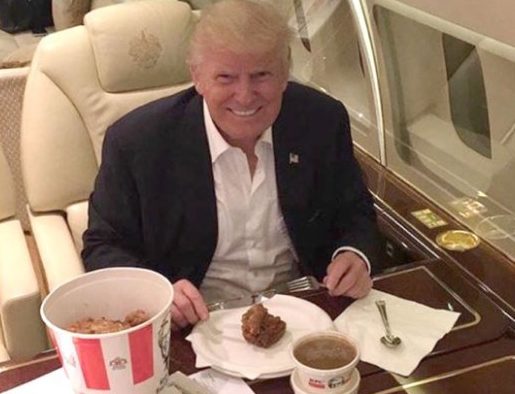After an exhaustive search, Michael Wolff finally located two Americans more unlikable than him–Donald Trump and Hillary Clinton–and he’s not letting go.
Wolff recently wrote a really good Hollywood Reporter profile of Trump, who desperately needs a food taster, but you’ll pry that pint of Häagen-Dazs from his cold, dead hands. In the same publication, he now writes of the final leg of a contest between two figures many voters see as a racist comb over versus a lying pantsuit, though anyone finding parity in the misdeeds of Trump, a virulently bigoted Berlusconi who aims to be a Mussolini, and Clinton, a politically expedient person but a solid Washington practitioner who’ll likely keep the trains running on time, is forcing a false equivalency.
It’s an entertaining piece as Wolff’s always are, though as is often the case with the writer, everyone in the article but him is depicted as an unknowing dolt. Additionally, Wolff’s portrayal of Trump voters as struggling, uneducated whites buys into a narrative that’s way overstated. His line that makes most sense is that it’s odd Hillary seems so driven to be likable in an election where that quality seems to not be an asset. Wolff ultimately gives Trump a greater chance at victory than any other major pundit or pollster.
An excerpt:
The Democrats’ strongest card was to present Trump as an existential threat and to foresee the breakdown of democracy’s fail-safe mechanisms. This also was quite an alarming approach. The guttural “Lock her up!” chants at the RNC seemed extreme enough. But in a way, the Democrats’ position was much more radical. Trump cannot be allowed; Trump is immoral; Trump is — the ultimate disqualifier — insane. In other words, if Duck Dynasty-type voters carry the day in November, that would not be an example of democracy but a failure of it.
The historic departure here is in arguing legitimacy over policies. In this, the Democrats appear to have two fears. The first is that traditional political techniques don’t work anymore and that Trump has significantly more mastery over the new techniques. The Democrats have spent $68 million on advertising so far. Trump: $6 million. How do you fight someone who doesn’t have to spend? The second is that the party’s own policies, pushed left by Bernie Sanders and focused on usually undependable young voters, are up against a backlash that it doesn’t know how to defuse and is opposed to accommodating — a protest vote by culturally adrift, undereducated white voters without precise political moorings, an identity group the Democrats hardly knew had an identity (this already may be a cliched portrait of the Trump voter, a broad approximation of people whom the media doesn’t know). As President Obama acknowledged, seeming to scratch his head, it’s not right nor left anymore, but something much more fundamental and frightening — but beyond that, he seemed as clueless as anyone.
The Democrats’ approach, in a convention whose television ratings outpaced the Republicans until the final day (Trump himself remains a bigger draw than Hillary) was to argue that there is an onrushing Trump apocalypse, but not to address any of the issues causing people to vote for the apocalypse. “Some people are angry, I get that,” said former Michigan Gov. Jennifer Granholm, but, more clearly, she was wholly bewildered, and not getting at all — along with the entire lineup of Democratic speakers — whatever it is that’s bothering Trump voters. In fact, if anything, the Democrats doubled down on many of the issues and cultural currents that seem most threatening to the Trump side, rather believing that Trump’s illegitimacy gave them the freedom to go increasingly left.
One drawback of successful propaganda is that instead of fooling everybody else, you only fool yourself.•
Tags: Donald Trump, Hillary Clinton, Michael Wolff

